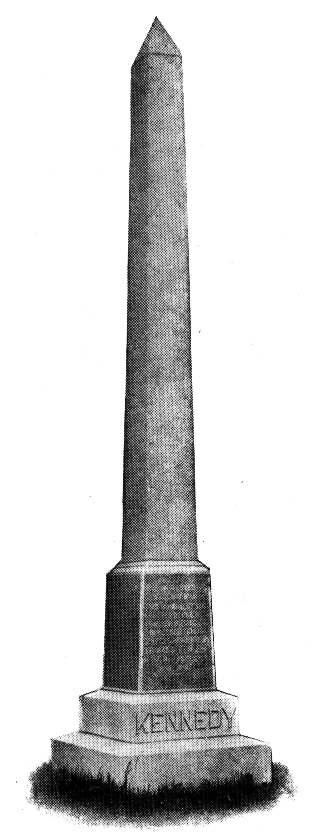Thomas Kennedy Center • c/o 53 East Baltimore Street • Hagerstown MD 21740 info@thomaskennedycenter.org
Thomas Kennedy Center • c/o 53 East Baltimore Street • Hagerstown MD 21740 info@thomaskennedycenter.org
Thomas Kennedy, Born 1776, Died 1832
The Maryland Constitution of 1776 provided that "all persons professing the Christian religion are equally entitled to protection in their religious liberty." This exclusion of non-Christians form a Constitutional guarantee of freedom of conscience was extended in Article 35: "No other test or qualification ought to be required on admission to any office of trust or profit than such oath of support and fidelity to the State... and a declaration of belief in Christian religion."
The exclusion of all who would not profess the Christian faith from positions of public trust in the state of Maryland continued until Thomas Kennedy, a man of Scottish Presbyterian origins, took up the fight "to consider the justice and expediency of placing the Jewish inhabitants on equal footing with the Christians."
Thomas Kennedy was born in Paisley, Scotland in 1776. He sailed for Georgetown in 1795 and, according to tradition, the first person he met upon disembarking was his brother Matthew, who had come down with the rest of the townspeople to watch the ship arrive.
In 1802, Kennedy married Rosamond Thomas from Frederick and signed a lease for mill land on the Conococheague. Two years later, he obtained a lot and probably built a home for himself and his family in the village of Williamsport.
Kennedy was first elected to the House of Delegates in 1817, representing Hagerstown. From the very beginning of his legislative career, he demonstrated an interest in social issues. In the words of his granddaughter, he "took an active part in politics largely...because of his interest in religious freedom."
Because of this interest, he was, in 1818, placed on a committee in the House that was to consider removing the "political disability of the Jews."
At the time, there were only about 150 Jews in Maryland. Thomas Kennedy had never even met one, but he was outraged by the injustice of excluding an entire group of people because of their religious beliefs. For him, religion was "a question which rests, or ought to rest, between man and his Creator alone."
The bill reported out of the committee in January 1819 was entitled "An Act to extend to the sect of people professing the Jewish religion the same rights and privileges that are enjoyed by Christians." When it was defeated, Kennedy pledged himself to renew the fight. The following year, Kennedy reintroduced the bill and it was defeated again by a wide margin.
These efforts to secure religious liberty for the Jews brought him virulent attacks as "an enemy of Christianity" and a "Judas Iscariot" and, in the election of 1823, Kennedy was defeated by Benjamin Galloway, who had spoken out strongly against the "Jew Bill." Even while out of office, Kennedy declared his intention to continue the fight: "although exiled at home, I shall continue to battle for the measure, aye, until my last drop of blood."
In 1825, Kennedy ran for the House of Delegates as an independent and was elected. By this time, public and press opinion in the state had turned in favor of the measure and in 1826, the bill became law. A few months later, two Jews were elected to the Baltimore City Council.
Having fully accomplished what he had set out to do some eight years earlier, Thomas Kennedy returned to Hagerstown where he put his long interest in writing to use by helping to establish the Hagerstown Mail, of which he later became editor. His fellow citizens again prevailed upon him to represent them in the General Assembly, and he was elected to the State Senate to serve out the term of a member who had died. He sat in the Senate from 1826 to 1831 but found that he preferred the Lower House and returned to that body in the next election.
An epidemic of Asiatic cholera claimed the life of Thomas Kennedy in October 1832.
 The bill that Thomas Kennedy helped to pass in 1826 extended political rights to Jews, but it still required that an officeholder profess belief in a "future state of rewards and punishments." This requirement was retained in the Maryland Constitution of 1851 and was not dropped until the present Maryland Constitution was adopted in 1867.
The bill that Thomas Kennedy helped to pass in 1826 extended political rights to Jews, but it still required that an officeholder profess belief in a "future state of rewards and punishments." This requirement was retained in the Maryland Constitution of 1851 and was not dropped until the present Maryland Constitution was adopted in 1867.
In 1995, the Speaker of the House of Delegates established the Speaker's Society for all past and present members of the House of Delegates. At its inaugural meeting, on March 22, 1995, the Society presented the first annual Thomas Kennedy Award. This award is given each year to a member of the Society, in recognition of his or her outstanding contribution to the democratic process and to extending the ground of public confidence in government of the people, by the people, and for the people.
One who loved his fellow man. --Inscription on Thomas Kennedy's burial monument, Hagerstown, Maryland. This monument was erected in 1918 by a few Jewish citizens in recognition of services rendered by Thomas Kennedy in the Md. Legislature of 1818.
----